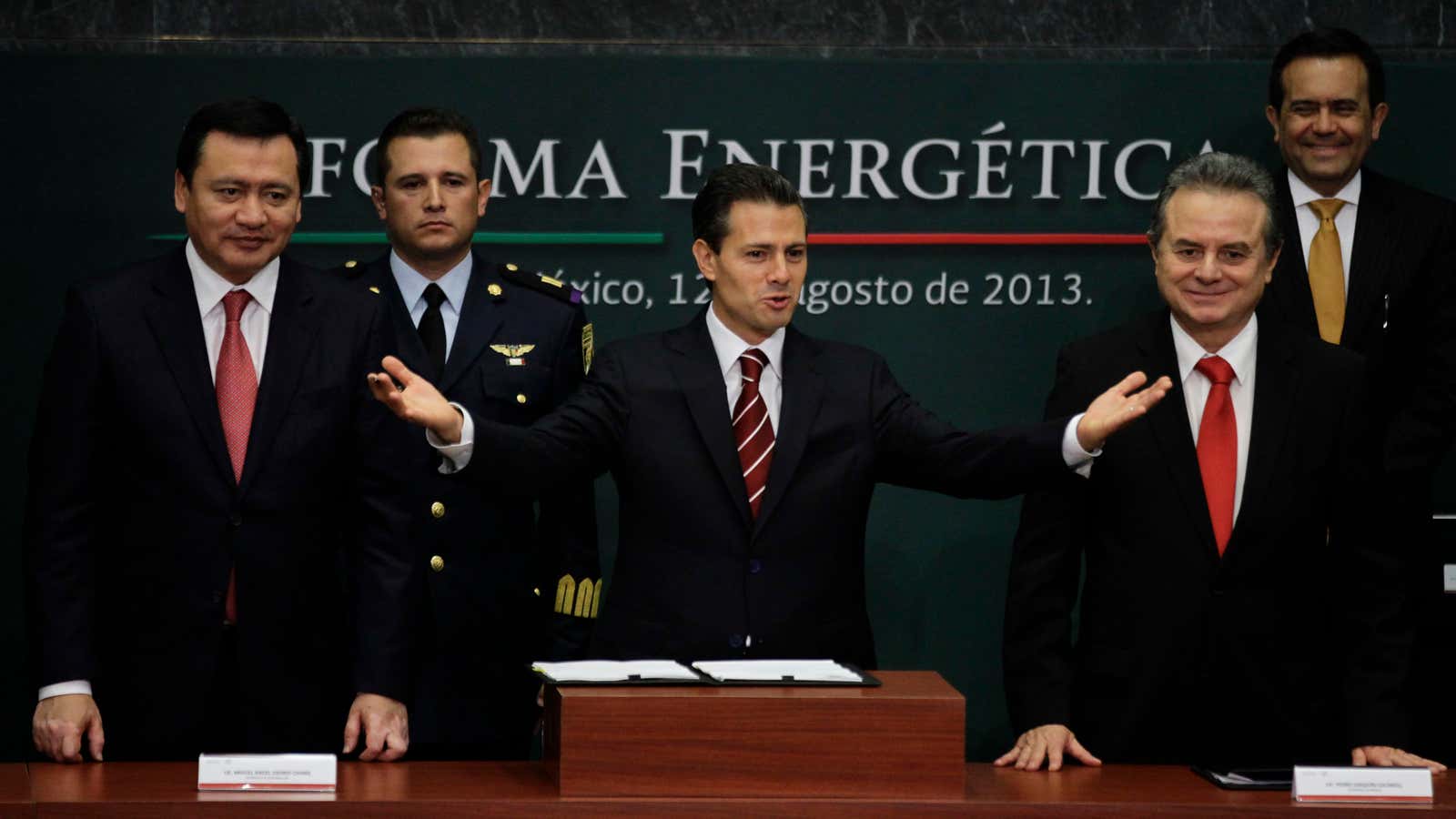After months of speculation, Mexican president Enrique Peña Nieto finally laid out his plan to overhaul the country’s struggling energy sector on Monday (Aug. 12). The question had been whether or not he would allow for privatization of the oil industry. And he answered it—sort of.
In a masterful balancing act, Peña Nieto reckoned he could find a middle ground between those who vehemently oppose opening up the state-run oil industry and those who believe it absolutely necessary. In his public remarks, he said he wants to open the sector to private and foreign investment, but not private and foreign production—meaning that foreign companies will be able to invest in Pemex, Mexico’s national oil monopoly, but not drill in or own the country’s reserves themselves.
Strange as the duality sounds, it’s quite astute—theoretically, anyway. Not allowing foreign companies to own the oil means Peña Nieto can still tell nationalists, for whom oil is sacrosanct, that the country hasn’t relinquished its precious reserves. César Camacho, chairman of Peña Nieto’s Institutional Revolutionary Party (PRI), said on Monday, “In no way is it a privatization. It is opening up the possibility for private capital to join public policies… without going as far as concessions.”
Fair. Except there seems to be a catch. Peña Nieto appears to have said one thing, but written another. ”If you actually look at the wording of the constitutional reform, it leaves the possibility of production-sharing open,” director of the Woodrow Wilson Center’s Mexico Institute, Duncan Wood, told Quartz.
The reform proposal document (pdf) notes that although president Lázaro Cárdenas is remembered—and treated as a national hero—for expropriating foreign oil firms, their total exclusion from Mexico’s oil industry did not come until some 20 years later. A 1940 law passed under Cárdenas said that “contracts can be signed with private entities to allow them to carry out exploration and exploitation [of oil] on behalf of the federal government,” (p. 9) so long as “the contractor does not acquire a direct right to exploitation of oil but only the right to obtain compensation.” (p.8)
However, notes the document, under Cárdenas’s law, “compensation for these contracts could be paid in cash or the equivalent as a percentage of the obtained products.” In other words, foreign firms could be promised a share of whatever oil they helped to drill.
And, it says, Peña Nieto’s idea now is to do something similar (p. 12):
The State will be able to take advantage of the participation of the social and private sectors, in a similar way to the Cárdenas reforms, through contracts for the exploration and extraction of hydrocarbons, which will be accompanied by pay mechanisms consistent with the mined resources, including cash compensations or equivalents as a percentage of the same, among others, as stipulated in the Cárdenas reforms…
That means foreign companies will presumably be able to strike deals in which they are able to share not only cash, but barrels, too. The ambiguous wording could effectively allow Mexico to act as it pleases, on a case by case basis. “If that’s the constitutional change, a lot is actually possible. It’s really, really unclear,” Duncan said.
In which case, equating the current reform to that of Cárdenas would be a clever political play. As a national idol, he cannot be attacked. Yet his reform in fact included a large grey area on how the nation’s oil could be used.
Why would Peña Nieto want to let foreign companies control barrels too? Essentially, it comes down to accounting. Mexico’s early success in finding shallow-water and inland oil has led to a crippling complacence about pursuing new exploration and technology. To develop the billions of barrels in reserves it’s still believed to have, it will need all the outside help it can get. The companies with most expertise in the deep-water and shale-rock formations that are believed to hold some 50% of Mexico’s oil reserves are in the US. And according to US Securities and Exchange Commission rules, they cannot book reserves from oil unless they have the rights to produce it. So if Mexico’s law disallows production-sharing, they will have a lot less incentive to take part.
Peña Nieto’s proposal, however, is still just that: a proposal. It still faces considerable hurdles in Mexico’s congress. But however much it changes, the government will try to leave a loophole that allows foreign companies to book reserves. If not, Mexico will be one of only four countries to allow profit-sharing, but not production-sharing. The others are Ecuador, Bolivia and Iran.
